by M. C. Jennings | May 7, 2020 | Academics, COBA Faculty, Current Students, Financial Management, Student Trading and Research (STAR), Uncategorized
Since its inception in 1999 with an initial amount of approximately $100,000, STAR has had several goals in mind. One of those goals was reached when the group hit a huge milestone with $1.5 million in their portfolio this past spring although the portfolio has dipped slightly with the recent economic crisis due to the COVID-19 pandemic. Another one of those goals was reached today when the group was able to make their first distribution from earnings.
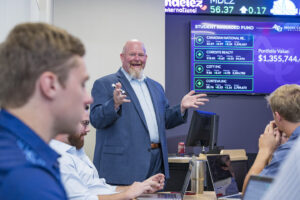
Photo by Jeremy Enlow
Assistant Professor of Finance Dr. Jody Jones, said that the distribution will be “$63,000, roughly 4.5% of the December 31, 2019 balance. Students ‘final’ this Thursday is to make sure they have the cash to distribute back to the endowment. The cash for this disbursement came primarily from gains made this semester on Ford (F), Gold (GLD), and decreasing the holdings in Healthcare Inc (HCA). As of this writing, the fund is $1.3 million (almost to the penny) and STAR is beating the S&P 500 by almost 5% YTD.”
STAR is a student-managed equity fund that is part of the university’s endowment. This semester the students must have $63,000 (4.5% of the 12/31 value) in cash. That money will be used to support the operation of the university as a whole. Jones says that students gain experience that will career over into their professional careers in the future. “Managing over $1 million dollars is something they can put on their resume and shows they have experience – especially this semester when many students lost jobs and internship opportunities.”
Senior Finance major Hunter Jennings said that he learned many things from his time in STAR. “I learned that in order to learn and be successful, you have to be willing to take risks. This experience will translate into my professional career because it pushed me to make decisions and effectively communicate my thoughts and ideas with my peers.”
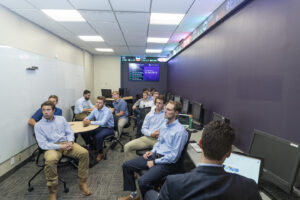
Photo by Jeremy Enlow
As for learning during a time when the stock market was particularly volatile, Jennings said, “The stock market can be rewarding and it can hurt you. It is all about how you react to those changes. There was a point where we had the fund to its highest value, just to have the market crash and the value go back to where we started.”
Hunter encourages students to consider being a part of the group. “I think that if anyone is interested in getting to work with a team and see real-world results, then they should join STAR. You don’t have to have any experience trading stocks or even be a finance major. Overall, it was one of my favorite classes to take at ACU.”
by Katherine Norris | Feb 27, 2020 | Academics, Accounting, COBA Faculty, Uncategorized
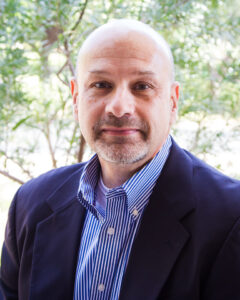
Dr. Curtis Clements
Efficiency is the key to accounting and the current key to efficiency is analytics. As the field of accounting advances and changes, so does the software, and therefore, the subjects taught in the accounting major. Dr. Curtis Clements saw the need for a course in accounting analytics and began teaching Audit Analytics, a graduate level class, last fall.
He explained that, historically, accounting has determined accuracy of financial statements by utilizing sampling. However, with programs like Tableau, Alteryx, Excel, etc., it has become possible to obtain, clean, and analyze data much more accurately and precisely. With the business world transitioning quickly into the world of analytics, Dr. Clements found it important to provide an opportunity for students to gain experience in one of the emerging disciplines and most crucial parts of accounting.
That goal was certainly met. The class was given access to Dillard’s department store sales data (housed at the University of Arkansas). This gave the students a real world feel to analyzing and working with large data sets. Dr. Clements wanted the class structure to give information and tools that would be practical in the future for each student’s career. The positive feedback give by students for the class led to an upgrade to the course textbook, which will lead to more information learned to put into action in the workplace.
Anthony Rodriguez, Master of Accountancy major from Argyle, Texas, participated in the inaugural class and  gave his seal of approval. “I really enjoyed the class. This past summer, during my internship at EY, I was selected as 1 of 60 interns nationwide to go to Hoboken, New Jersey to attend a training in auditing analytics. The software packages we were taught in training were Tableau and Alteryx. One of the things I took from the training was how much technology can impact an audit for the better. Also, as 1 of only 60 interns, I would have an advantage over some of my peers. The Audit Analytics course at ACU touched on some of those same topics- specifically Tableau. As the course went along, I realized that we were learning much of the same material Ernst & Young (EY) had deemed a worthy investment. From my short experience in New Jersey, I saw how technology will begin impacting how audits work. Clearly, if EY invested as much money as they did to develop their Digital Ambassador Intern Program, it seems as though the Big 4 accounting firms want to get a head start on this trend. It is really awesome that COBA and Dr. Clements have begun offering this course to ACU students. Our careers will only get more and more digital, so it’s great that ACU is offering this course to help set its students apart from the competition.”
gave his seal of approval. “I really enjoyed the class. This past summer, during my internship at EY, I was selected as 1 of 60 interns nationwide to go to Hoboken, New Jersey to attend a training in auditing analytics. The software packages we were taught in training were Tableau and Alteryx. One of the things I took from the training was how much technology can impact an audit for the better. Also, as 1 of only 60 interns, I would have an advantage over some of my peers. The Audit Analytics course at ACU touched on some of those same topics- specifically Tableau. As the course went along, I realized that we were learning much of the same material Ernst & Young (EY) had deemed a worthy investment. From my short experience in New Jersey, I saw how technology will begin impacting how audits work. Clearly, if EY invested as much money as they did to develop their Digital Ambassador Intern Program, it seems as though the Big 4 accounting firms want to get a head start on this trend. It is really awesome that COBA and Dr. Clements have begun offering this course to ACU students. Our careers will only get more and more digital, so it’s great that ACU is offering this course to help set its students apart from the competition.”
Audit Analytics was a resounding success and Dr. Clements is working to make sure the class will continue improving and adjusting to meet the demands of the field in the future as the tools for accounting analytics advance. The Master of Accountancy program prepares accounting students to meet the demands of the field, in whatever type of firm or accounting career they seek to work in. Click here to learn more about ACU’s Master of Accountancy program.
by Katherine Norris | Feb 13, 2020 | Academics, COBA Faculty, COBA Staff, Faith Infusion, Special Speakers
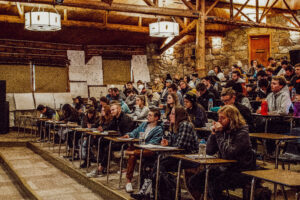
Leadership Summit 2020
Leadership Summit 2020 is complete and the students have cleared out and come back to ACU with jaws wide open and a new mindset. This year I (Katie Norris ’22) joined my fellow classmates in experiencing Leadership Summit at Frontier Ranch in Buena Vista, CO in early January. If you don’t know much about Summit, the most important thing to know is that it is a challenging process that pushes you to do the things you are passionate about but haven’t had the courage or tools to step up and do yet. We call this our “River Crossing” on the mountain. Luckily, we didn’t have to cross any actual rivers in the rather icy weather.
My purpose in writing this blog is to recap the trip and give a student insight as to what happens on the mountain that leads so many people to come away from Leadership Summit with a new perspective and motivation.
A typical day at Summit would begin at 8:00 am and end about 9:00 pm with a nice two hour break in the middle of the day. Students spent the time participating in case studies, listening to speaker sessions, interactive breakout sessions, small group processing time, worship, and various activities like archery tag, taking hikes, and the Screamer (picture attached).
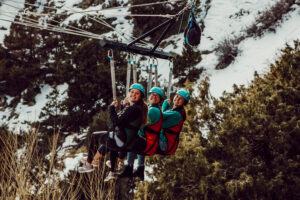
The Screamer
What’s beautiful about Leadership Summit is that it is all about utilizing your leadership potential (whether that be a role as a leader in your organization or something as simple as being a son or daughter) and being a servant to the communities you are a part, for their betterment. Not only were we given a charge from Dr. Dennis Marquardt and Dr. Rick Lytle to make an impact using our leadership roles, but we were given astonishing examples of people who have done so themselves and who gave us tools to succeed in our own visions.
This is done through the testimonies of distinguished guest speakers. We spent much of our time listening to accomplished people from different backgrounds speak on a variety of topics. This year, we were blessed with the opportunity to hear Mo Isom Aiken (New York Times best-selling author), April and Mark Anthony (founders of Encompass Home Health and Homecare Homebase ), Kathy Crockett (professor and consultant), Wendy Davidson (President of Away From Home, Kellogg Company), Elise Mitchell (Entrepreneur, CEO, consultant, and executive coach), Carlos Sepulveda (Chairman of Triumph Bancorp, Inc.), Rick Atchley (preaching minister at the Hills Church of Christ), Tim Goeglein (Vice President for External and Government Relations at Focus on the Family in Washington), David Eaton (founder of Axis), Stephen Quinn (Chief Marketing Officer of the CEO Forum), Janeen Uzzell (Global Technology Executive at Wikimedia), and Mike Willoughby (Chief Executive Officer at PFSweb). To show our thanks for the words spoken over us, we sang “The Lord Bless You and Keep You” over each speaker after their session. On top of all of this, one of the perks of Leadership Summit was also the opportunity to sit with these speakers at meals, get to know them, and ask them questions.
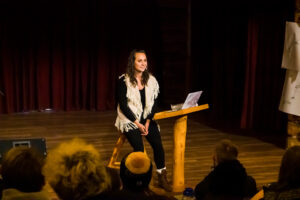
Mo Isom Aiken
Each and every River Crossing project was uniquely crafted based off of each individual student’s passions, life journey, and values. In order to bring us to a place where we could recognize each of those factors, we completed assignments before our week on the mountain that allowed us to consider what we truly value based on how we spend our time. We also were asked to write down major points in our life that shape our perspective and what we are passionate about in something called a “Journey Line”. I had no preexisting expectations of what Summit would be like and found some assignments to be what I thought was simple busywork. Dr. Marquardt quickly challenged that idea when we worked through our values session. He presented a statement based off of that assignment that gave the realization that we may not always value what we say we value over other things that we choose to make time for. This made everyone in the room rethink how they spend their time day to day, to think about what they truly value, and what they need to value more.
One really unique experience came from completing a “Journey Line” that showed the points in our life that we felt like were pivotal moments in a “highs and lows” sort of fashion. At the beginning of the week, we were asked to write this “Journey Line” on a giant paper that we hung on the walls where they remained for the week. This was a neat experience as we got to walk around the room during free times and read our peers’ journey lines. In my observations, it gave us a mindset of understanding and an excitement to dig deeper with each other throughout the week.
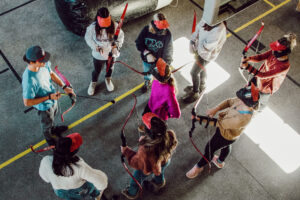
Archery Tag
We were continually astonished by the relevant and practical speaker sessions that were faith focused. Speaking for everyone at Summit, I can say it was refreshing to hear people boldly talk about the true and hard things in life. As students, we were especially grateful to hear professionals speak more into life than business plans and profit maximization.
Over the course of the week we participated in activities that grew our friendships, relationships, faith, knowledge, and inspiration to do great things. To close out the week-a graduation ceremony. Not quite what you would expect from a business short course. Maybe that’s why we students found it so impactful. God seems to work even on the mountains in life.
by Katherine Norris | Feb 7, 2020 | Academics, COBA Faculty, Current Students, Financial Management, Research, Uncategorized
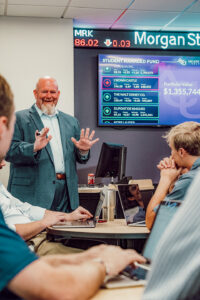
Jody Jones mentoring the STAR Fund Managers
Do you know about everything that goes on in COBA? We have so many awesome student programs, that chances are, you may have missed a few! STAR (Student Trading and Research) is a program where students learn to research an investment portfolio and trade assets based off their information. STAR began as an idea in 1999 and with an initial gift by a generous donor of $110,000 in June of 2000, ended its first full year of operation in 2001. Today, STAR manages a portion of ACU’s endowment and reports to the ACIMCO Board annually. STAR began as a student organization guided by Dr. Terry Pope and Dr. Jonathan Stewart. Now, students can earn course credit while they earn valuable real-world experience.
That kind of learning is something that Assistant Professor of Finance Dr. Jody Jones, who began teaching at ACU this past fall, is passionate about. Jones took over the STAR course after Dr. Pope retired last spring. Jones feels that one of the greatest learning opportunities that STAR affords is autonomy to the students in learning to make financial decisions. “All decisions are made by students. Although a faculty member helps guide decisions, the buying and selling of assets is dictated by student managers.”
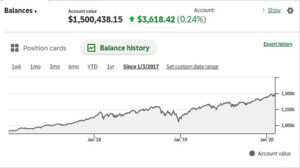
Since inception, STAR has achieved an average return of nearly 50 basis points above its benchmark: S&P 500
Total Return Index. That’s reason enough to celebrate for any advising firm but this week STAR hit a huge milestone – the portfolio currently holds an outstanding $1.5 million.
Why is that such an important milestone? Dr. Jones explained, “The rising value of STAR allows students to better diversify and have more freedom in investment decisions. With the primary goal of the course being educational, students can buy and sell many assets and gain a broad perspective on the market. Also, this year will make it the first year that STAR has made distributions. The fund will return 4.5% of its value to the endowment to support scholarships, campus initiatives, and operations of the university.”
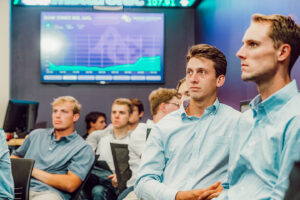 While STAR mainly consists of finance majors, anyone who is interested can join and is encouraged to do so. If needed, students can even apply to receive course credit for being a fund manager.
While STAR mainly consists of finance majors, anyone who is interested can join and is encouraged to do so. If needed, students can even apply to receive course credit for being a fund manager.
Dr. Jody Jones loves his profession for more than the numbers. He is passionate about integrating faith into his work and teaching. “While many of the student managers intend to work in the investment and financial services fields after graduation, financial management is important for all organizations and households. Stewardship is also a spiritual discipline.”
by Katherine Norris | Feb 6, 2020 | Academics, COBA Faculty, Marketing
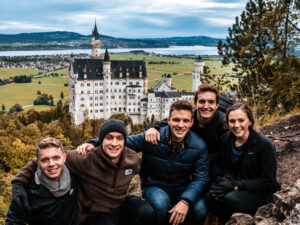
In the fall of 2019, Dr. Mark and Dr. Laura Phillips embarked on a semester long journey with a group of students on a study abroad trip to Leipzig, Germany. If you are interested in studying abroad, or simply hearing about the adventures that happen abroad, Dr. Laura Phillips has given us a beautiful recap of what it looks like to immerse yourself in a different culture for an extended period of time. Thank you to Riley Simpson, junior management major from Dripping Springs, TX, who studied in Germany with the Phillips for the amazing photos in this blog post.
“The students all took 6 hours of German through a local language school that was about a 30-minute walk or a 20 minute tram ride from the villa. We had class in three hour blocks and class met either two or three times per week. The classes were taught by native German speakers, which was great. (I took the German classes with the students.) All the students also took the Global Studies class which covers German history and culture. Mark taught that class and the in-class materials were supplemented with guest speakers and field trips within Leipzig as well as trips to Berlin, Wittenburg (important in the story of Martin Luthur and the reformation), and Weimar (where we visited Buchenwald, a Nazi concentration camp).”
There were also several business classes offered, including: Principles of Marketing, International Business, and Life Design, a class taught by both Mark and Laura as an honors colloquium and one hour business course. Students were allowed to take any online classes they wanted to add to their schedule. Most classes were taught at the villa in Leipzig, but they would also occasionally meet for field trips. These included: Spin Lab, a startup business accelerator, Blüthner Pianos, and the BMW factory 
I asked Mark and Laura to recap their semester abroad and this was Laura’s response:
”How do you recap an entire semester abroad? A few things I can share that may give you a flavor of the trip/experience.
-
- We went to Berlin as a group after the students had been in Leipzig one week. Our trip was three days and we were able to see and do some very interesting things. Even after having lived in Leipzig for only a week, at the end of our Berlin trip multiple students expressed how glad they were to get back “home.”
-
Founded in 1853, Blüthner Piano is one of a handful of ultra high-end piano makers on earth. We learned about the company, oddly enough, at church in Leipzig, where we met an American who worked for Blüthner in California and now heads their marketing efforts. An hour-long series of bus rides (including one stop where some of our people failed to get off) took us to the factory. There we had free access to walk through and see how deluxe pianos have been hand-built since the 1800’s. Today the company is seeing growth in demand from China, even as Europeans and Americans are less interested. It has also added a second line of less expensive pianos for those unwilling to pay the premium their brand can still charge.
-
As American companies and their customers battle back and forth over privacy, the European Union has moved much more quickly to protect consumers. And the demand for privacy is even more vocal in former East Germany, where for decades the government and a vast network of citizen spies kept tabs on everyone. At the height of the Cold War, 1 in 8 East Germans was spying on other East Germans for the secret police; part of the current resistance to Christianity there is because so many clergy were revealed to have been informing. Leipzigers are very uncomfortable having strangers take their pictures, and children are strictly protected (we hosted a group of children from a nearby school for a meal and only the school’s designated photographer was allowed to shoot pictures. American companies doing business here must move carefully in order not to offend.
- Over the course of the semester we all found some favorite cafés, restaurants, and parks.
- We became comfortable interacting with a city where all the signs are in German. Students who traveled outside of Germany for long weekends expressed how comforting it was to get back to the airport or train station in German and hear people speaking German again (even though we still couldn’t understand much of it).
- We had students who used their travel weekends and week to explore other regions of Germany as well as hit a number of other destinations in Europe, but it was cool because they didn’t just explore the normal destinations of London, Paris, Rome. They also went to Budapest, Vienna, Amsterdam, Copenhagen, Dublin, Milan, Pisa, Florence, and some less well-known destinations in Switzerland and Norway. Several of the students even rented cars and took road trips!
- We had a good sized group of students who became very involved at ICF–the church to which Lindsay (who lives on site at the villa) belongs. They became involved and connected even though the services were in German!
- We experienced true German culture by attending a Red Bull soccer game and participating in the crowd chant that occurs after every goal. We had numerous chances to practice the chant because Leipzig won 8-0! We also attended an orchestra concert (the Leipzig orchestra has been a performing group for over 200 years!) and a handball match. Over the course of the semester groups of students attended concerts and/or the ballet (Nutcracker) on their own.
- At one point some students from the Oxford group came to Leipzig to visit. Our students were surprised at how tentative the visitors were because of the language difference (which they hadn’t experienced in Oxford). Until then I don’t think our students realized how much they had grown because of the difference in languages and how comfortable they had become in spite of it. Knowing they can live and thrive in a country that speaks a different language gave them more confidence as they headed out to
explore other destinations.”
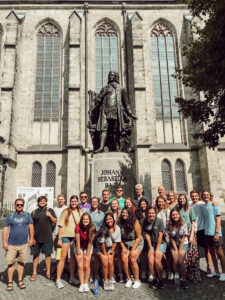
In their time abroad, the Phillips made sure to build time in to go on interesting excursions to different countries and experience different culture, one of these being Greece. “Greece was amazing. It came at a great time in the semester. We had just finished our first “semester” of German and the weather was getting cooler in Germany. It was awesome to take a break from classes and spend 10 amazing warm, sunny days in Greece! We saw super cool archaeological sites like the Acropolis, ancient Corinth, the ancient Olympic stadium in Olympia, the oracle of Delphi, etc. We had very knowledgeable tour guides that helped make each of these sites interesting and meaningful. We had a free day in each destination so we were able to explore the towns, hike, go to the beach, rent a boat, and so on.”
“Whatever we did d uring the day, whether it was together or on our own, we regrouped for a meal together each evening. It was a good time to reconnect and share stories from the day.” Next, they adventured to Prague and integrated what they had learned to what they were seeing. “We took a four day group trip to Prague late in the semester. For this trip the students served as tour guides for the different sites we visited. They prepared their research and then delivered their information to the rest of the group as we took a walking tour around the city. At one site a couple of women from Italy were sitting on a bench nearby. As our student went through her spiel, they held up numbers on their phones, rating her presentation. It was fun to interact with other people who were seeing the same cool sites that we were. In Prague we had our family meal at a Mexican restaurant! It was fun to have some “familiar” food in a far away place!”
uring the day, whether it was together or on our own, we regrouped for a meal together each evening. It was a good time to reconnect and share stories from the day.” Next, they adventured to Prague and integrated what they had learned to what they were seeing. “We took a four day group trip to Prague late in the semester. For this trip the students served as tour guides for the different sites we visited. They prepared their research and then delivered their information to the rest of the group as we took a walking tour around the city. At one site a couple of women from Italy were sitting on a bench nearby. As our student went through her spiel, they held up numbers on their phones, rating her presentation. It was fun to interact with other people who were seeing the same cool sites that we were. In Prague we had our family meal at a Mexican restaurant! It was fun to have some “familiar” food in a far away place!”
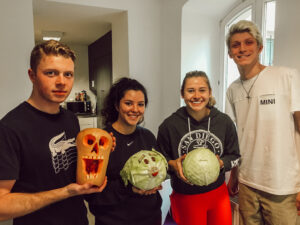
(Picture by Laura Phillips
As with anything, there are always cool, funny, interesting, and strange stories to tell. Halloween was no exception to for the bunch. “We planned to have a pumpkin carving activity on October 30th so that afternoon we headed to the store as a very large group to pick out pumpkins. Lindsay said there were plenty in a big box outside the store but when we arrived, there were no pumpkins. We went to two other stores (as a very large group) but no luck. We ended up having to go back to the first store and the students picked out various things, such as small cooking pumpkins, butternut squash, and in one case two cabbages! Needless to say the carvings were interesting and unique and the students did an awesome job of improvising. Halloween isn’t as big of a deal in Germany but the students wanted to trick or treat at the villa. To make this feasible, students could volunteer to be a ‘host’ or they could choose to trick-or-treat or do both or nothing. Everyone who wanted to trick-or-treat had to dress up and then the hosts spread out around the villa. Since just visiting five or six rooms and getting candy would take about 10 minutes, it became a trick-and-treat activity. There was an activity at each ‘house.’ Some of the activities included solving riddles, playing MarioKart, playing pictionary, writing and then reading a Halloween poem, and doing a TikTok. Two of the students dressed up as us!”
And it is no surprise that a few travel issues were involved: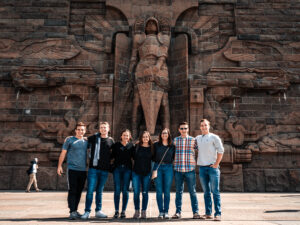
-
-
- “On one of the early weekends, a group of girls made their hostel reservations for the wrong nights and ended up having to sleep in the common room of the hostel the first night.
- A group of guys took a camping trip in Norway. Two of the guys slept outside in hammocks and it was a bit chillier than they were prepared for.
- Coming back from a small German town by myself (with my bicycle) the train I was on split into two pieces. Only one half want back to Leipzig and I was on the wrong half. I discovered this when we arrived at a city I knew was the wrong direction from where I wanted to go. I had to get on another train back to where I started and try again!”
To end their time in Germany, there was a closing ceremony in which many of the students demonstrated their musical talents. “One of the students spoke and then at the end, four of them went up for the closing number and unexpectedly busted out with a very energetic version of ‘I Will Survive’. It caught us all off-guard but was hilarious and so awesome! The students could give you many more funny moments.”
Phillips ended with, ”It was a great semester of exploration, bonding with the group, game nights, devos, group meals, getting lost, being confused…”
-Laura Phillips + a ditto from Mark
by Katherine Norris | Jan 23, 2020 | COBA Faculty, COBA Staff, Current Students, Outcomes, Placement stories, Student Spotlights, Uncategorized
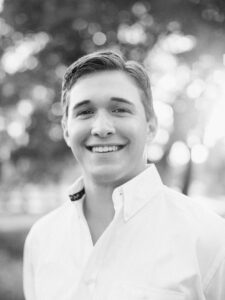
Zach Jennings
Zach Jennings is a Management major from Abilene, Texas and graduated in December 2019. Zach interned with Edward Jones this last summer. “I learned the basics of what it takes to be a financial advisor. I got to work with other offices and two other interns in town. There were about 200 interns nationwide, so having even one intern in Abilene was awesome, but we had three!”
As Zach prepared for graduation, he also prepared to begin work with Edward Jones as a financial advisor. He says, “I believe my time at ACU helped me find out what I wanted to do moving forward. Not only did it prepare me for my future career, but I grew so much in my relationship with God because of the wonderful people here.” Zach found that he wanted a career with Edward Jones after his experience as an intern and is looking forward to the great opportunities laid before him.
Zach enjoyed his college career at ACU. We asked him what his favorite thing about being a part of COBA was and how the environment influenced his growth throughout his time here. “My favorite thing about COBA was attending Leadership Summit. I grew a lot in the Lord and made so many good friendships as well. It was a refreshing and soul-quenching experience. I would say that ACU offers not only some of the best education programs out there, but what makes ACU great is the community. You actually get to know your professors and you’ll realize they want to get to know you too. The community of ACU is welcoming, inclusive and Christ-like. The people here are what sets ACU apart from the rest.”
Helping students find how their gifts and talents can be used for God in the workplace is something COBA is passionate about. For those students who aren’t sure what career path they want to take, COBA and ACU provide exploration through the COBA Edge professional development program and the guidance offered at the Career Center. To learn more about the COBA Edge program, students can email Steph Brown at srb19c@acu.edu. Students can also learn more about internships, interviewing, and career search information by reading the COBA student newsletter, looking through Handshake, or contacting Steph Brown or the ACU Career Center.



 gave his seal of approval. “I really enjoyed the class. This past summer, during my internship at EY, I was selected as 1 of 60 interns nationwide to go to Hoboken, New Jersey to attend a training in auditing analytics. The software packages we were taught in training were Tableau and Alteryx. One of the things I took from the training was how much technology can impact an audit for the better. Also, as 1 of only 60 interns, I would have an advantage over some of my peers. The Audit Analytics course at ACU touched on some of those same topics- specifically Tableau. As the course went along, I realized that we were learning much of the same material Ernst & Young (EY) had deemed a worthy investment. From my short experience in New Jersey, I saw how technology will begin impacting how audits work. Clearly, if EY invested as much money as they did to develop their Digital Ambassador Intern Program, it seems as though the Big 4 accounting firms want to get a head start on this trend. It is really awesome that COBA and Dr. Clements have begun offering this course to ACU students. Our careers will only get more and more digital, so it’s great that ACU is offering this course to help set its students apart from the competition.”
gave his seal of approval. “I really enjoyed the class. This past summer, during my internship at EY, I was selected as 1 of 60 interns nationwide to go to Hoboken, New Jersey to attend a training in auditing analytics. The software packages we were taught in training were Tableau and Alteryx. One of the things I took from the training was how much technology can impact an audit for the better. Also, as 1 of only 60 interns, I would have an advantage over some of my peers. The Audit Analytics course at ACU touched on some of those same topics- specifically Tableau. As the course went along, I realized that we were learning much of the same material Ernst & Young (EY) had deemed a worthy investment. From my short experience in New Jersey, I saw how technology will begin impacting how audits work. Clearly, if EY invested as much money as they did to develop their Digital Ambassador Intern Program, it seems as though the Big 4 accounting firms want to get a head start on this trend. It is really awesome that COBA and Dr. Clements have begun offering this course to ACU students. Our careers will only get more and more digital, so it’s great that ACU is offering this course to help set its students apart from the competition.”





 While STAR mainly consists of finance majors, anyone who is interested can join and is encouraged to do so. If needed, students can even apply to receive course credit for being a fund manager.
While STAR mainly consists of finance majors, anyone who is interested can join and is encouraged to do so. If needed, students can even apply to receive course credit for being a fund manager.





